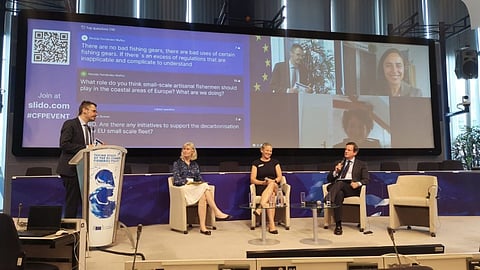

On Friday, June 10, the European Commission organised a stakeholder event to take stock of the current EU Common Fisheries Policy (CFP). The President of Europêche, Javier Garat, analysed the progress made, challenges and way forward. In a nutshell, the sector believes that a reform is needed on some core elements such as the landing obligation or the definition of fishing capacity. The CFP must also adapt to new geopolitical and environmental challenges such as climate change but cannot be overridden by environmental legislation.
Adopted in 2013, the CFP amounted to a radical overhaul of the existing fisheries policies. All stakeholders in the event recognised that these resulted in a speedy recovery of fish stocks across Europe, particularly in the Northeast Atlantic. However, sector representatives voiced that this was achieved at the expense of the fleet, which had to face significant job losses, unworkable rules, a global pandemic, and an energy crisis, threatening fishers to become an "endangered species".
Europêche regretted that many current and past fisheries policies have been based on emotions and not on science. Clear examples can be found for instance in the landing obligation proposed in reaction to a campaign launched by a famous chef in the UK or the current call to ban bottom trawling.
"Our fishers need rational and understandable rules that allow them to remain competitive and innovative," the chef said. "Unapplicable legislation and new radical environmental policies generate mistrust and tension between the sector, public authorities and society. Besides, there are so many rules, that fishers need to be practically lawyers to go fishing. This needs to change now. We have a new window of opportunity to learn from past mistakes and to adapt to future needs and global demands."
In this direction, a scientific panelist recommended to rethink the landing obligation and to perhaps using a different approach to achieve the goal to avoid unwanted catches and eliminate discards.
Europêche reminded that a resilient marine environment is a must, but it is equally important to provide conditions for a thriving sector and food supply, in line with the Treaty of the EU. For all these reasons, Mr Garat stressed that fishers should be at the heart of the CFP. In this context, the sector stressed the need for more and better science, including socioeconomic impact studies on the impact of fisheries policies. Furthermore, fishers called for continued access to their traditional fishing grounds, which are rapidly being taken by new marine activities or intended for marine protection. Garat warned that this trend will put at risk EU food sovereignty.
Mr Garat criticised that under the current CFP, the space on board destined to the kitchen, cabins, toilets or recreational areas are considered as part of the fishing capacity. He argued that this definition should be revised to allow the introduction of new technologies to decarbonise the sector and to improve safety and working conditions, which require more space on board, thereby the need to find alternative formulas, such as net tonnage, that exclude these habitable spaces when measuring fishing capacity.
Europêche also believes in the need to strengthen the external dimension of the CFP and ocean governance, for which more financial and human resources are needed. In this vein, the sector recalls the importance of fisheries agreements signed with third countries for the EU fleet and stresses the need to apply the same rules to all vessels operating in international waters to guarantee a level playing field. Europêche equally appreciates the work of the commission in the fight against illegal fishing globally. Finally, the sector reiterates its call for the recognition of the role of joint ventures in third countries.
